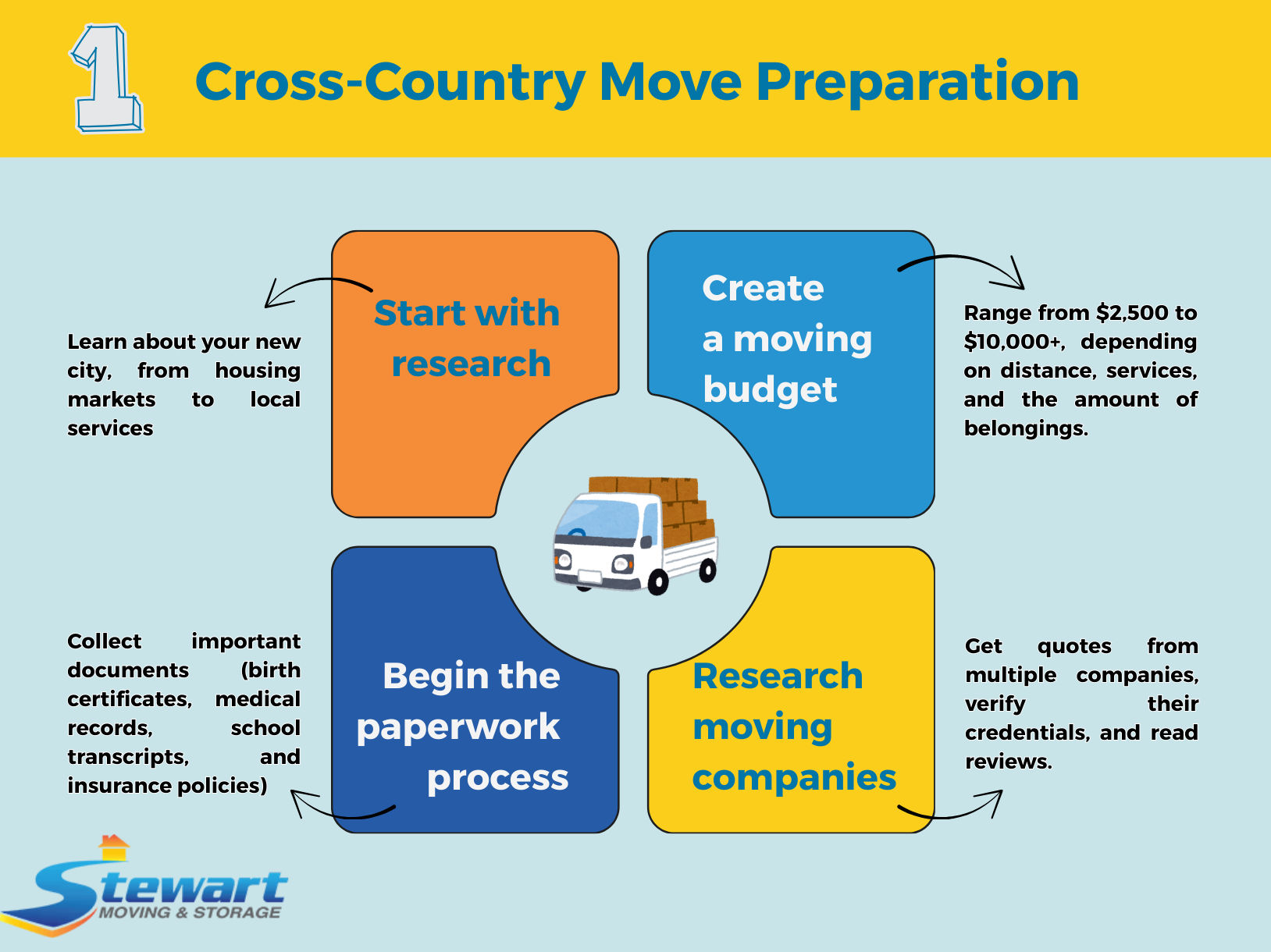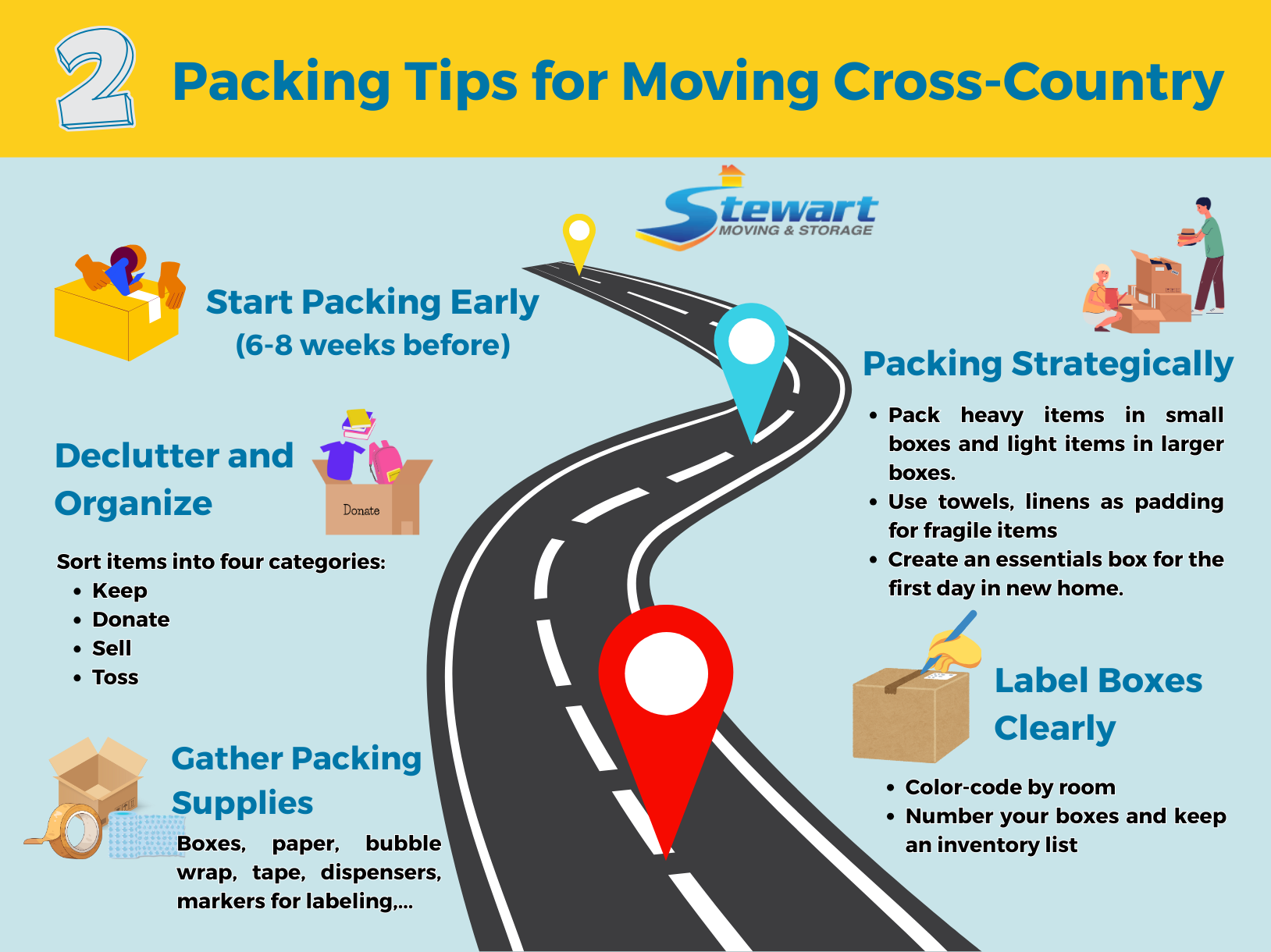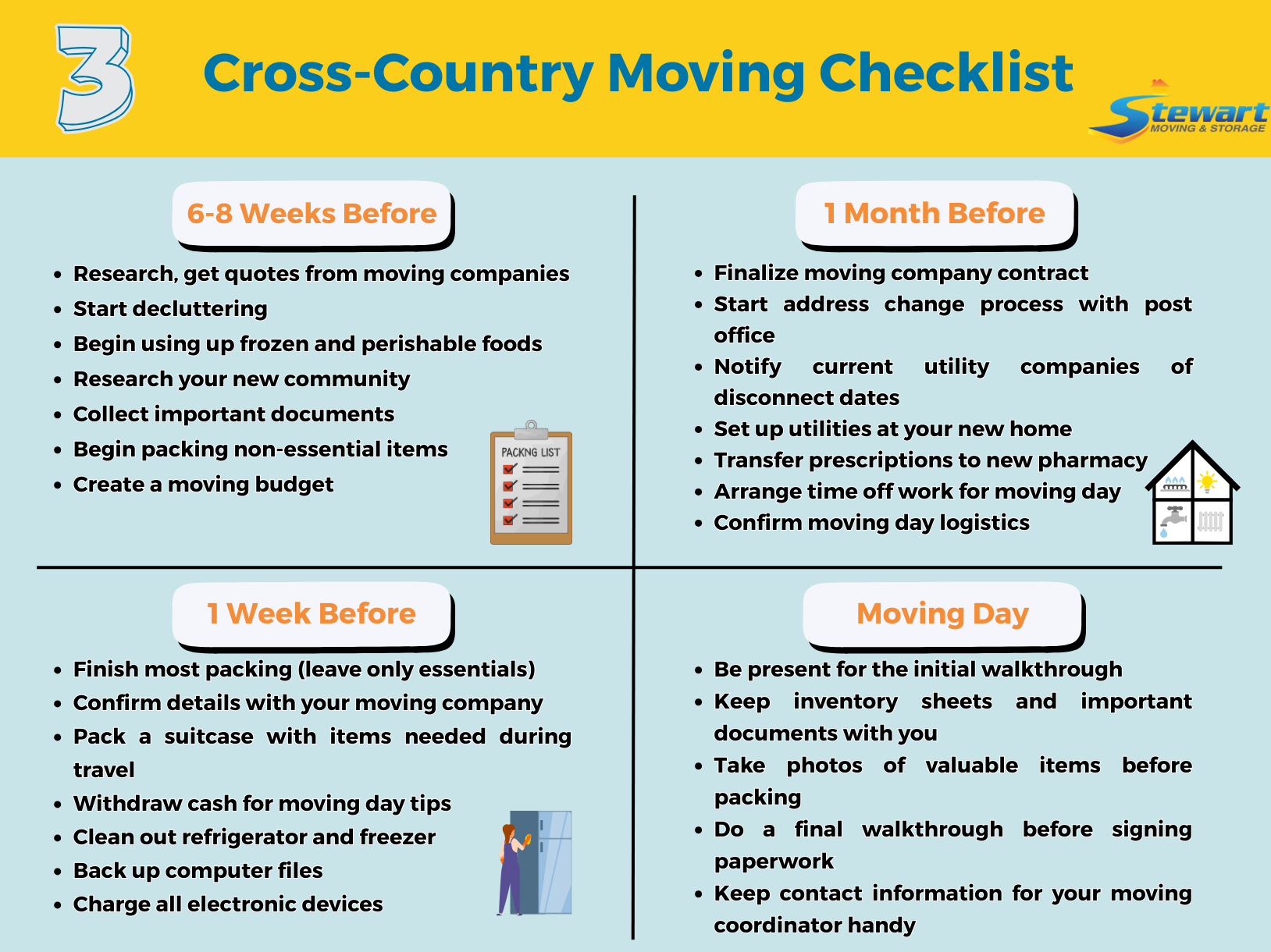Moving across the country? Take a deep breath – you've got this! Whether you're relocating for a new job, family reasons, or just ready for a fresh start, preparing for a cross-country move doesn't have to feel overwhelming. With the right cross-country moving tips and a solid plan, you can turn this major life change into an exciting adventure.
At Stewart Moving & Storage, we've helped thousands of families navigate cross-country moves over the past 20 years. We know every challenge you'll face before you even encounter them, and we're here to share our best tips for moving cross-country so you can have the smoothest relocation possible.
Learn more:
- A Checklist for Virginia Residency Requirements 2026
- How To Move Heavy Furniture By Yourself: 19 Easy Ways & Tricks
- Change of Address Checklist 2026: Who to Inform When You Move to a New Address?

Why is Cross-Country Moving a Big Challenge?
Let's be honest – cross-country moving is a whole different beast than moving across town. When you're preparing to move across the country, you're dealing with longer distances, higher costs, more complex logistics, and the emotional weight of leaving everything familiar behind.
The biggest challenges include:
- Distance and time: Your belongings will be in transit for days or even weeks
- Higher costs: Long-distance moves typically cost significantly more than local moves
- Limited oversight: You can't easily check on your items during transport
- Timing coordination: Arrival dates can be less predictable
- Emotional stress: Leaving your community, friends, and familiar places behind
But here's the good news: With proper preparation and the right moving partner, these challenges become manageable. The key is having a comprehensive plan and following proven tips for moving across the country.
Learn more:
- Packing Tips for a Long-Distance Move | Expert Guide
- How to Move a Grandfather Clock Safely in 10 Simple Steps
1. Preparing for a Cross-Country Move
Preparing for a cross-country move starts months before your moving truck arrives. Success lies in the details, and the earlier you start planning, the smoother your experience will be.

Start with research
Learn about your new city, from housing markets to local services. Understanding your destination helps reduce anxiety and allows you to make informed decisions about what to bring versus what to replace.
Create a moving budget
Cross-country moves cost can range anywhere from $2,500 to $10,000+, depending on distance, services, and the amount of belongings. Factor in not just moving costs, but travel expenses, temporary lodging, and immediate needs for your new home. Plan your move with our moving quotes guide.
Begin the paperwork process
Start collecting important documents like birth certificates, medical records, school transcripts, and insurance policies. You'll need these readily accessible during your transition.
Research moving companies early
Get quotes from multiple companies, verify their credentials, and read reviews. At Stewart Moving & Storage, we believe in complete transparency – we'll walk you through every aspect of your move so there are no surprises. Get your custom quote today.
Learn more:
- How to Pack Kitchen Items for Moving | Expert Guide
- How Long Does It Take Movers to Move Cross-Country? Full Timeline
2. Packing Tips for Moving Cross-Country
Packing for a long-distance move requires a different strategy than local moves. Your belongings will travel hundreds or thousands of miles and may be loaded and unloaded multiple times. Here are our proven cross-country moving tips for packing:

Start Packing Early
Begin packing non-essential items 6-8 weeks before your move. This includes seasonal clothing, books, decorative items, and rarely used kitchen appliances. Starting early reduces stress and gives you time to pack carefully rather than rushing at the last minute.
Create a packing schedule and tackle one room at a time. This systematic approach prevents you from feeling overwhelmed and ensures nothing gets forgotten. You can learn more about packing tips for your stress-free move.
Declutter and Organize
Moving cross-country is the perfect opportunity to lighten your load. The less you move, the less you'll pay – and the easier your unpacking will be!
Go through each room and sort items into four categories: keep, donate, sell, and toss. Be ruthless – if you haven't used something in over a year, you probably don't need it in your new home. Consider the cost of moving items versus replacing them at your destination.
Host a garage sale, sell valuable items online, and donate usable goods to local charities. Many families find they can reduce their moving volume by 20-30% through strategic decluttering.
Learn more:
How To Pack Plates and Dishes For Moving, Tips Keep Plates Safe
Gather Quality Supplies and Materials
Invest in high-quality packing materials – your belongings will thank you after their long journey! You'll need:
- Various-sized boxes (small for heavy items, large for light/bulky items)
- Packing paper and bubble wrap
- Packing tape and dispensers
- Markers for labeling
- Furniture pads and plastic wrap
- Wardrobe boxes for hanging clothes
Don't skimp on protection. Items traveling cross-country face more handling and potential for damage than local moves.
Pack Strategically
Pack heavy items in small boxes and light items in larger boxes. This makes boxes manageable for movers and reduces the risk of box failure.
Use your soft goods (towels, linens, clothing) as padding for fragile items. This saves space and provides excellent protection.
Create an "essentials" box for each family member with items needed for the first few days in your new home. Include medications, toiletries, a change of clothes, and important documents.
Learn more:
Moving an Aquarium: How to Pack and Move a Fish Tank
Label Boxes Clearly
Develop a labeling system that works for you. Include the destination room and a brief description of contents. Consider color-coding by room for easy identification.
Number your boxes and keep an inventory list. This helps track everything and makes unpacking more organized.
3. Find and Save Your Cross-Country Moving Checklist
Having a comprehensive moving cross-country checklist keeps you organized and ensures nothing falls through the cracks. Here's your timeline:

6-8 Weeks Before:
- Research and get quotes from moving companies
- Start decluttering and donating items
- Begin using up frozen and perishable foods
- Research your new community
- Start collecting important documents
- Begin packing non-essential items
- Create a moving budget
1 Month Before:
- Finalize your moving company contract
- Start address change process with post office
- Notify current utility companies of disconnect dates
- Set up utilities at your new home
- Transfer prescriptions to new pharmacy
- Arrange time off work for moving day
- Confirm moving day logistics with your moving team
1 Week Before:
- Finish most packing (leave only essentials)
- Confirm details with your moving company
- Pack a suitcase with items needed during travel
- Withdraw cash for moving day tips
- Clean out refrigerator and freezer
- Back up computer files
- Charge all electronic devices
Moving Day:
- Be present for the initial walkthrough
- Keep inventory sheets and important documents with you
- Take photos of valuable items before packing
- Do a final walkthrough before signing paperwork
- Keep contact information for your moving coordinator handy
Learn more:
- How to Pack a TV for Moving Safely | TV Shipping Guide
- Movers in Portsmouth, VA | Professional Moving Company
4. Seek Moving Advice from Your Network
Don't underestimate the value of cross-country moving advice from people who've been there! Reach out to friends, family, and colleagues who have made similar moves.
Ask specific questions: Which moving companies did they use? What would they do differently? What unexpected expenses came up? Their experiences can save you time, money, and stress.
Join online communities and forums for people relocating to your destination city. These groups often share valuable local insights about everything from the best neighborhoods to reliable service providers.
Learn more:
A List of Things We Can’t Move and Why
5. DIY Move vs. Hiring a Moving Company
One of the biggest decisions when planning cross-country moves is whether to do it yourself or hire professionals. Here are things to consider when moving across the country:
DIY Cross-Country Moving
- Pros: Lower upfront costs, complete control over timing and handling
- Cons: Physically demanding, time-consuming, no coverage, hidden costs can add up
Professional Moving Services
- Pros: Professional handling, valuation coverage, saves time and physical strain, experienced with long-distance logistics
- Cons: Higher upfront costs, less control over exact timing
For most families, hiring professional movers for cross-country relocations makes financial and practical sense. The peace of mind, valuation coverage in case of an accident, and professional handling typically outweigh the higher costs.
At Stewart Moving & Storage, we offer flexible service levels to fit different budgets – from full-service packing and moving to partial services where we handle just the transportation while you do the packing.
Learn more:
- Interstate Moving Services | Cross-State Mover
- How to Hire An Interstate Moving Company: Steps to Choose a Mover
6. Consider Using a Storage Service
Sometimes your timeline doesn't align perfectly. Maybe your new home isn't ready, or you need time to decide what fits in your new space. This is where storage services become invaluable for cross-country moves.
Professional storage facilities offer:
- Climate-controlled units to protect your belongings during extended storage
- Flexible timing to store items for weeks, months, or longer as needed
- Security features, including surveillance and controlled access
- Easy coordination with your moving services
- DOD-approved storage for your PCS military move
Stewart Moving & Storage operates state-of-the-art, secure storage warehouse facilities that can seamlessly integrate with your moving timeline. We can store your items at the origin, destination, or both – whatever works best for your situation.
7. Settle Into Your New Community
The best way to move stuff cross-country is with a plan for settling in once you arrive! Your moving journey doesn't end when the truck is unloaded – now comes the exciting part of making your new place feel like home.
- Update your address with banks, credit cards, insurance companies, subscription services, and government agencies. The post office's mail forwarding service helps, but updating addresses directly is more reliable.
- Cancel local memberships and subscriptions that don't transfer, such as gym memberships, local newspapers, or streaming services with location restrictions.
- Find new local services like doctors, dentists, veterinarians, and hair stylists. Ask neighbors for recommendations – it's also a great way to start building relationships!
- Explore your new area systematically. Drive around different neighborhoods, locate grocery stores and pharmacies, find the closest hospital, and discover parks or recreational areas.
- Get involved in your community by joining local groups, attending community events, or volunteering. Building connections helps transform your new location from just a place you live into a true home.
Learn more:
- Moving to Jacksonville, FL? Here's what you should know before relocating.
- Moving to Pensacola, FL
- Quality and Professional Moving Service to Fayetteville NC
Professional Cross-Country Moving Services by Stewart Moving & Storage
Ready to experience the difference that 20+ years of moving expertise makes? Stewart Moving & Storage has been helping families navigate cross-country relocations with truth, honesty, integrity, and diligence since our humble beginnings.
Why Choose Stewart Moving & Storage?
- Comprehensive services: From full-service packing to storage solutions, we handle every aspect of your move
- Experienced team: Our 200+ professionally trained employees know how to handle your belongings with care
- Advanced facilities: State-of-the-art, DOD-approved warehouse facilities across multiple states
- Family values: As a family-owned company, we treat every customer like family
- Military heritage: We're proud to serve our service members and understand unique military moving needs
- Proven track record: Award-winning service with thousands of successful cross-country moves
We don't just move your belongings – we provide peace of mind. Our Move Consultants work with you to create a customized moving plan that fits your timeline, budget, and specific needs.
Ready to get started? Contact Stewart Moving & Storage today for your free estimate. Call us at 888-566-9737 or
request your online quote. Let us show you why families across the country trust us with their most important relocations.
FAQs About Cross-Country Moving Tips
How do I prepare for a cross-country move?
Start preparing 6-8 weeks before your move date. Create a comprehensive checklist, begin decluttering, research your new location, and get quotes from reputable moving companies. The key is starting early and staying organized throughout the process.
How much money should you have to move across the country?
Cross-country moving costs vary widely based on distance, services, and amount of belongings. Budget $3,500-$10,000+ for professional moving services, plus travel expenses, temporary lodging, utility deposits, and immediate needs for your new home. Get detailed quotes from moving companies for accurate estimates.
Is moving cross-country hard?
Moving cross-country presents unique challenges, including higher costs, longer distances, and the emotional stress of leaving familiar surroundings. However, with proper planning, professional help, and the right mindset, it can be a smooth and even exciting experience. The key is preparation and working with experienced movers.
What do I get rid of when moving cross-country?
Focus on items that cost more to move than replace: old furniture, outdated electronics, heavy books, excess clothing, expired items, and anything you haven't used in over a year. Consider the cost per pound to move items versus buying replacements at your destination.
How do I move cross-country alone?
Moving cross-country alone requires extra planning and support systems. Hire professional movers for the heavy lifting, stay connected with friends and family throughout the process, research your destination thoroughly, and consider flying to your new location while your belongings are transported. Don't hesitate to ask for help when you need it.
What is the best way to move my stuff cross-country?
The best way to move stuff cross-country is typically to hire professional long-distance movers who specialize in cross-country relocations. They provide FVP (Full Replacement Value Protection), professional handling, and logistical expertise that DIY moves can't match. Choose a reputable company with experience, proper licensing, and positive customer reviews.



